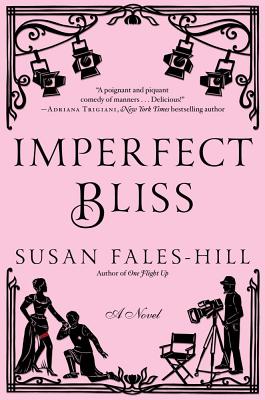 Imperfect Bliss
Imperfect Bliss
by Susan Fales-Hill
NY: Atria Books, 2012; 304pp
The narrative and social challenges facing women in the early twenty-first century are at the center of Susan Fales-Hill’s second novel, the romantic comedy Imperfect Bliss. Its heroine, Bliss (Elizabeth) Harcourt, spends much of her time attempting to shield her young daughter, Bella, from the pernicious myth that princesshood is both attainable and desirable. Her sisters — Diana, Charlotte, Victoria — all struggle, more or less consciously, with the roles pressed upon them by that oppressive Big Other of adulthood, reality TV. Their mother, a woman who’s so successfully internalized the racist jibes she suffered as a child that she’s placed a ban on her daughters marrying black men, is the grotesque (if not unsympathetic) product of a lifetime of such social molding. Forsythia’s aspirations for her daughters are grand, as evinced by her naming them after British royals, but they do not necessarily involve happiness.
When we meet Bliss, she’s on day 375 of a sex drought following her separation from her by-now-ex-husband Manuel, a politician she caught cheating in his campaign office. Divorced, mid-thirties, and sharing a room with Bella in her family home in an upmarket suburb in Maryland, Bliss is the perpetual butt of her mother’s scorn. Not so her sister Diana, who has been selected to appear on a new reality show called The Virgin.
“Mummy, it’s going to be incredible. I get courted by a whole bunch of guys, and I get to pick which one I want to marry!” [Diana] squealed, overcome with delight and flashing her pearly whites. Forsythia closed her eyes, as if beatified, and quickly said a prayer of thanks in her head to the very God she’d lambasted in the morning.
For Forsythia, this is the ultimate triumph: “her next-to-youngest would become a household name and select a husband.” Prestige ill-won is prestige nonetheless; happiness (and integrity) can go hang. Bliss, Victoria, and their father, Harold, are unimpressed (“It’s called ‘female trafficking,'” Bliss points out). But their misgivings are ignored, and filming of The Virgin begins.
Of course, Diana’s success as a television star depends as much on her excellent looks as the narrative the network is able to spin around her family. “Loving the overweight black mom,” comments Sue Minors, vice president of MBC; “We can get her a deal with Jenny Craig.” Later, in a grand Viennese hotel on one of the show’s Eurotrip stop-offs, “Bliss imagined her mother entering the double-height-ceiling marble hall and swooning on the spot. Sue Minors and the network would love it: a pudgy black woman making an utter fool of herself, a true ratings bonanza.” The image is so familiar, it’s scarcely satirical.
 Fales-Hill, who worked on The Cosby Show, A Different World and Suddenly Susan, and created Linc’s, has had something of a hand in shaping the evolving national dialogue on both race and the representation of women. Imperfect Bliss, which was published in 2012, might be considered something of a report card. The casual racism the Harcourts experience — the way they’re expected to fit an existing media narrative of biracial family life — isn’t presented as an outrage, merely how it is. TV wants the crazy black mom. Meanwhile, Forsythia’s racial prejudices, born of self-disgust, are an indictment of the white suburbia she longs to belong to. Even in the more elevated battleground of academia, Bliss, applying for a fellowship, is made to feel second-rate by the other candidates, who are heard to mutter that her success would only be the result of affirmative action.
Fales-Hill, who worked on The Cosby Show, A Different World and Suddenly Susan, and created Linc’s, has had something of a hand in shaping the evolving national dialogue on both race and the representation of women. Imperfect Bliss, which was published in 2012, might be considered something of a report card. The casual racism the Harcourts experience — the way they’re expected to fit an existing media narrative of biracial family life — isn’t presented as an outrage, merely how it is. TV wants the crazy black mom. Meanwhile, Forsythia’s racial prejudices, born of self-disgust, are an indictment of the white suburbia she longs to belong to. Even in the more elevated battleground of academia, Bliss, applying for a fellowship, is made to feel second-rate by the other candidates, who are heard to mutter that her success would only be the result of affirmative action.
And then there’s Fales-Hill’s spot-on attack on the media’s sexualization of innocence (…even if there’s very little that’s truly innocent about Diana’s plotting). When one of the suitors on The Virgin is caught breaking his vow of chastity, Sue Minors’ first reaction is to start planning Diana’s wardrobe for the next episode:
“I say go virgin dominatrix. I’m seeing a white-leather bustier and skirt with some strappy sandals. We want to make every guy in America wish he could be ‘the one’ and wish he could be punished by her.”
A woman who has supposedly never had sex is made to dress in high-street fetish gear in order to “punish” a man who’s meant to be courting her. At the same time Charlotte, the youngest Harcourt sister, and the most sexually active of the lot, is made to pay for what are deemed her “transgressions” when a sex tape shows up. The hypocrisy staggers.
But Imperfect Bliss is not an “issues” book. Yes, it’s closely tuned in to the conversations being had in America today about race, feminism, and adolescent sexuality. But what makes it fun is that it’s also a good old-fashioned Jane Austen-style lark. There’s a fella — the smooth-talking TV host Wyatt Evers — and then there’s another fella — Dario Fuentes, who bears a superficial resemblance to Manuel — both of whom may or may not be more or less what they seem. Both rather caddish; both — it seems — pursuing Bliss. There are stolen moments, significant looks, cryptic pronouncements. Manuel himself also shows up, to complicate matters further. And through the chinks in her armour, Bliss proves herself to be what Roxane Gay would call a “bad feminist” (which is OK, FYI): she wants her academic research and her high ideas, and she wants Bella to grow up in a world free of Barbie dolls and gendered play and pink stuff; but she also sorta kinda wants to jump on the back of a motorbike with a man with big hands. In this warm book, in which our notions of character are constantly tested — and our sympathies shift and broaden as the pages flick by — all this really proves is that to be human, and to be happy, one must accept such contradictions.
Susan Fales-Hill will appear at Runnin’ Wild, the House of SpeakEasy Gala, on January 28 at City Winery. Tickets can be purchased here. We will return to our regular pricing for our Seriously Entertaining show No Return on March 9.
Sponsored by:





